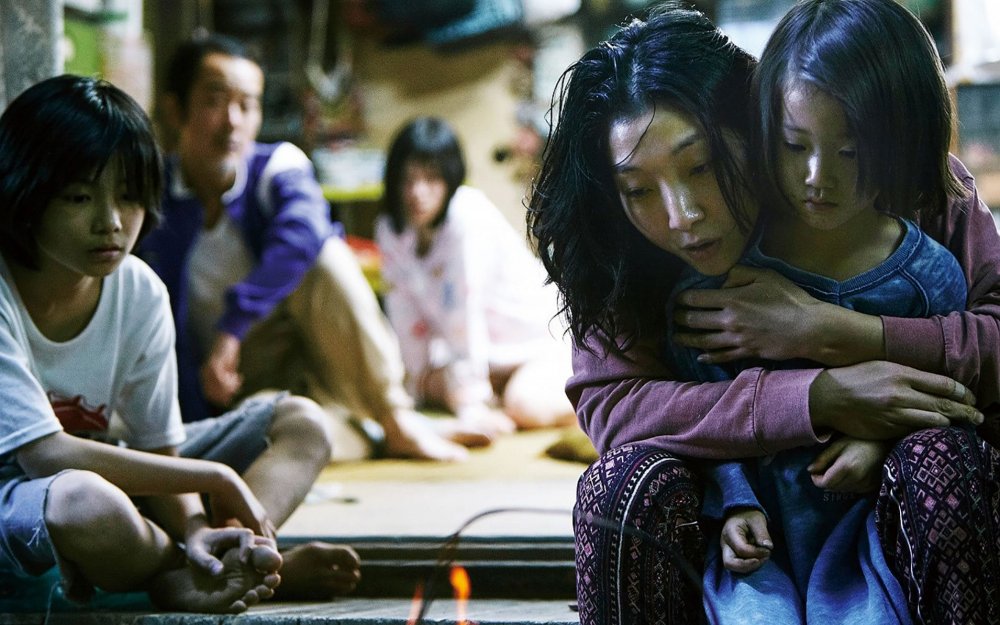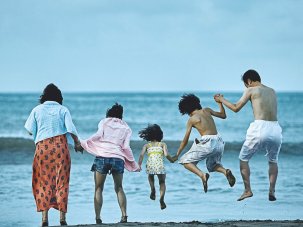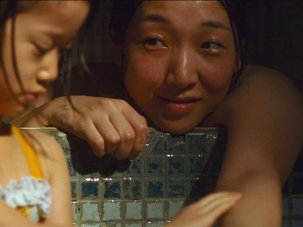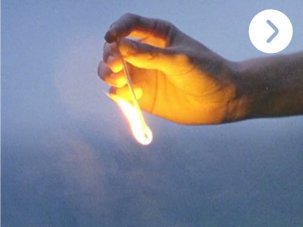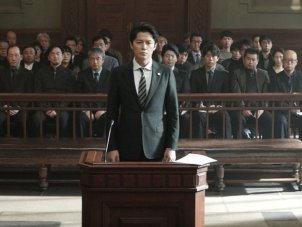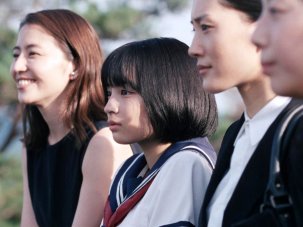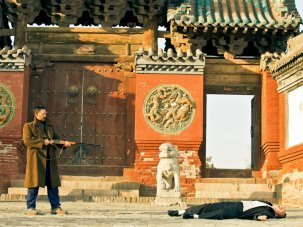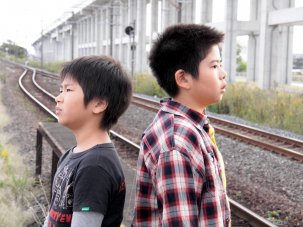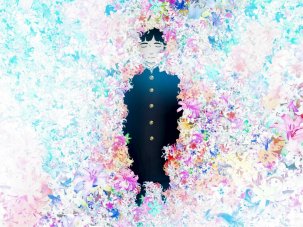Spoiler alert: this interview discusses plot developments in Shoplifters.
In a career in feature filmmaking that now spans nearly a quarter of a century, Koreeda Hirokazu has become certainly the most critically acclaimed and among the most widely distributed of contemporary Japanese live-action directors. His subjects range from the samurai of Hana (Hana yori mo naho, 2006) to the blow-up doll come to life in Air Doll (Kuki ningyo, 2009), and his chosen genres from fantasy (After Life / Wandafuru raifu, 1998) to courtroom drama (The Third Murder / Sandome no satsujin, 2017).
Shoplifters is in UK cinemas now.
However, his most frequent and fertile territory is that of the family drama, a genre of distinguished pedigree in Japan going back to the era of Ozu and Naruse, both of whom Koreeda acknowledges as influences. Like Ozu, Koreeda works with a company of regular actors (most notably Kiki Kilin, who died earlier this year) who enact variations on a set of key themes, helping to imbue his work with a specific and individual flavour. In films like Nobody Knows (Dare mo shiranai, 2004), Still Walking (Aruitemo aruitemo, 2008) and After the Storm (Umi yori mo mada fukaku, 2016), he has explored different aspects of the Japanese family in an era of social transition and economic uncertainty. When, in May, 2018, he won the Palme d’Or at Cannes for his new film Shoplifters (Manbiki kazoku), he became the first Japanese director to secure that honour in 21 years, since Imamura Shohei took the prize for The Eel in 1997).
- Shoplifters first look: a wonky family lament that weaponises Koreeda’s compassion
- Film of the week: Shoplifters reveals Koreeda’s masterfully light touch
Koreeda was no stranger to Cannes; in 2013, he won the Cannes Jury Prize for Like Father, Like Son (Soshite chichi ni naru) in 2013, and his star Yagira Yuya scooped the youngest ever Best Actor award for his performance in Nobody Knows. I spoke to him at BAFTA before the UK release of Shoplifters.
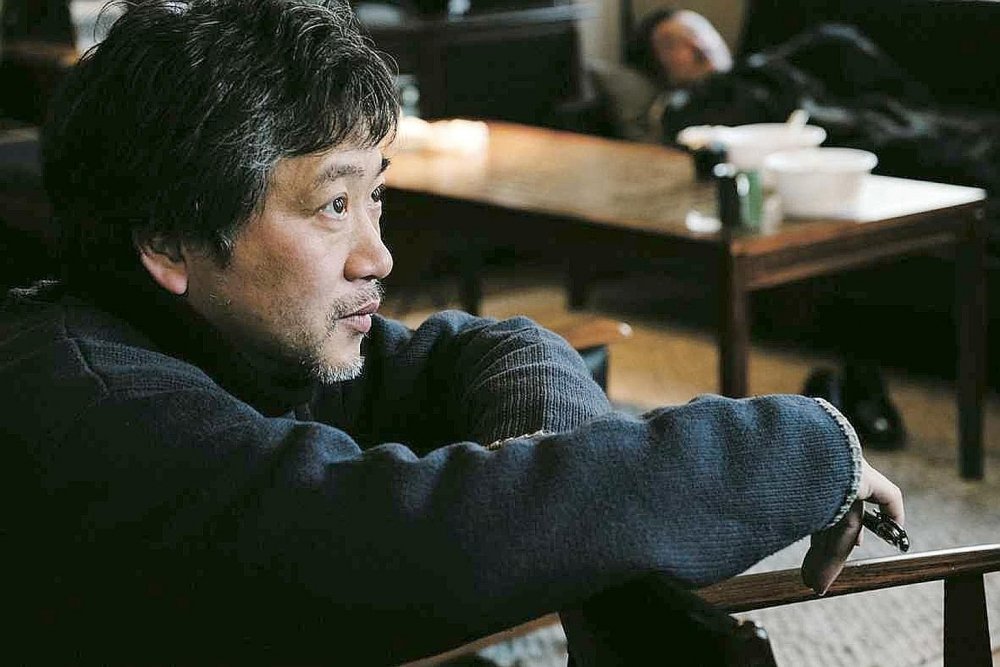
Koreeda Hirokazu on the set of Shoplifters (2018)
Shoplifters won the Palme d’Or at Cannes, the first Japanese film to do so in more than 20 years. What do you feel accounts for this special success? Do you think it’s your best film?
As a filmmaker, it’s very difficult to say which is my best; I think it’s more up to other people to make that judgement. They probably have more right to do so than I do. But if I think of filmmaking as a birthing process, and the films as my children, then this birthing process was the easiest one. I was using the cameraman [Kondo Ryuto] for the first time, and it was also my first time working with [actor] Ando Sakura, but it worked very well.
Things certainly went very well in Europe, with your triumph at Cannes, and the film enjoyed commercial success in Japan. But in June, you turned down an invitation from the Ministry of Education and Culture to celebrate. You’ve talked in another interview about the importance of “keeping a clear distance from government authority”. Could you say more about your motive for that decision?
I’m a filmmaker, but also a television person; my background is in TV. And I feel concerned about the current broadcasting situation in the sense that they don’t criticise the current government at all. The media is failing to serve its true purpose.
It’s probably unheard of in the West that the heads of news outlets have lunch and dinner with top government officials, ministers, politicians, the prime minister. They ought to be in the position of criticising, keeping watch, keeping check on the current government, but they’re not. And say, for example, a sportsperson wins an award abroad, then the government congratulates that person by inviting him to the prime minister’s office to take photographs with him, or by sending a congratulatory message – all that sort of thing. That makes me feel sick; I don’t understand why they don’t feel more of a sense of danger.
The arts and sport are very prone to being used politically. Looking back on Japanese history, I think it’s important for cinema not to get too close to the powers that be. This has been a basic principle for me. In particular, the administration of [Prime Minister Shinzo] Abe has survived for a long time now, but there has been no evaluation of its position regarding broadcasting, the arts or the constitution. I thought I ought to distance myself from such things; and I think they thought so too.
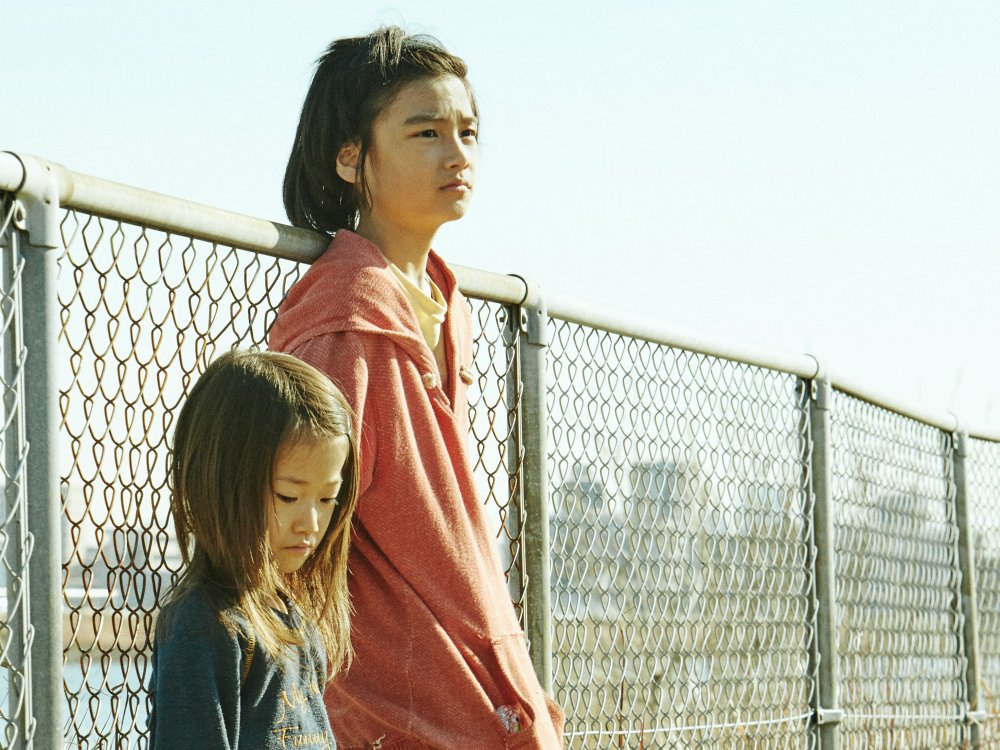
Miyu Sasaki with Matsuoka Mayu as Shibata Aki / ‘Sayaka’
One of the aspects of the film that seems to have caused some controversy is that it seems to create a rather negative portrait of modern Japanese society, and I suppose you could say the same about Nobody Knows, or Air Doll. Do you feel that this film, and perhaps your films more generally, create a picture of a society that is heading in the wrong direction?
Maybe there’s a bit of that, but if I depicted just the positive things about Japan, that would be nothing more than a tourist film, a promotional film. I think you should have variety, depict all sorts of things.
But it seems that the criticism and the negative comments about this film, since its release, is mainly online. None of these critics seem to grasp the actual nature of the film, and they don’t seem to get the point. In many interviews I get asked about this criticism from Japan, but I don’t have very much to say about it; I don’t think it’s going to get you very far, really, because it hasn’t got much substance.
One of the negative things that you treat in this film, of course, is crime. Even the title indicates that it’s a film about crime. And that’s not the first time you’ve addressed this theme. Your previous film, The Third Murder, is a courtroom drama; crime is a concern in Air Doll; in Like Father, Like Son the babies are swapped in a criminal act; in Distance (2001) you explore the aftermath of a terrorist attack.
Japan is actually still a rather low-crime society. In other interviews, I know you’ve discussed real-life crimes like child abuse, like the attack on the shinkansen [bullet train]. But why have you chosen in so many films to focus on crime? Do you feel your films express a particular attitude to the causes of crime and to its possible solutions?
I don’t think I’m trying to indicate a solution, or anything; there’s no way I can do that. But I think one of the reasons I’ve treated the subject so many times: a lot of crimes happen in Japan, but people tend to view crime as a matter of individual responsibility. They see it as this or that person’s fault, rather than something born out of society and social ills. So they just punish that person – because it’s that person’s fault, his individual responsibility – they treat it as nothing more than that. That’s how they solve the problem in Japan.
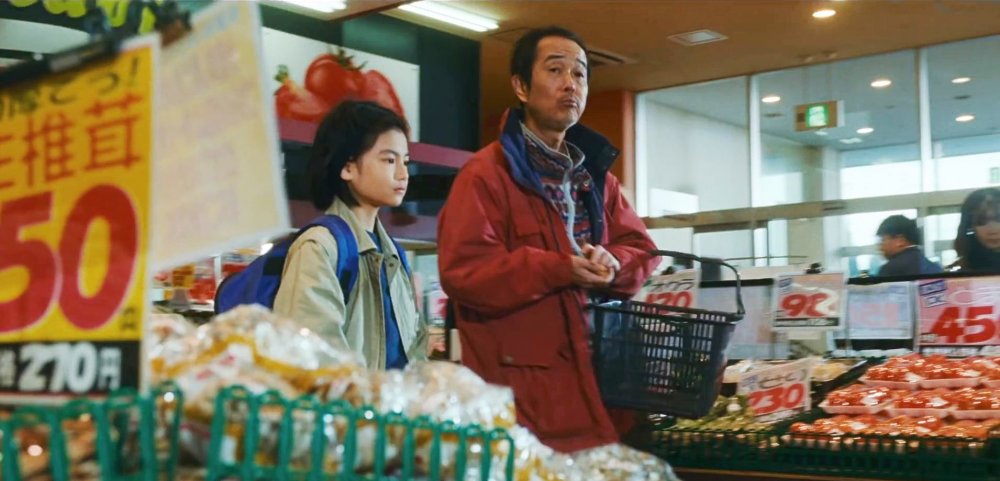
Jyo Kairi with Lily Franky as Shibata Osamu
But I think… maybe this is old-fashioned, but I believe crime is something that is born out of society; it’s society’s responsibility. It’s something that we need to look at it, and I think I treat it as something that we as a society need to address. We need to reclaim those criminals, and the causes of their crimes, as part of a communal property. Crime is something that we, as a society, own collectively; I think it’s something we need to reclaim and accept as our responsibility, rather than the individual’s.
Another parallel I noticed between two of those films about crime, Shoplifters and Distance, is that they end with the same spoken word, ‘Otosan’: ‘father’.
The last line in Distance is “Father”, but in Shoplifters, he’s mouthing it; you can’t hear what he’s saying.
That’s true. In any case, the link points to another factor that unites very many of your films: the theme of family. Shoplifters is about a very unconventional family; and at one point in the film we hear a character speculate that the bonds you form with a family you choose might be more intense than what you feel for blood relatives.
Really that seems your quintessential theme. Your recurrent subject is the family. And especially in Nobody Knows; in Like Father, Like Son; in Our Little Sister (Umimachi nikki, 2015), and now in Shoplifters, you’ve asked, “What matters more, blood ties or human affection?” What has drawn you so frequently to that question? Do you feel it would be better if family were a thing that we chose?
It’s probably not so much a question of what I think and how I feel about the family. I didn’t want to present such a stark choice. I think there are different ways of looking at the question. It’s not “Which is stronger?” but “Is blood enough to make you a family?”
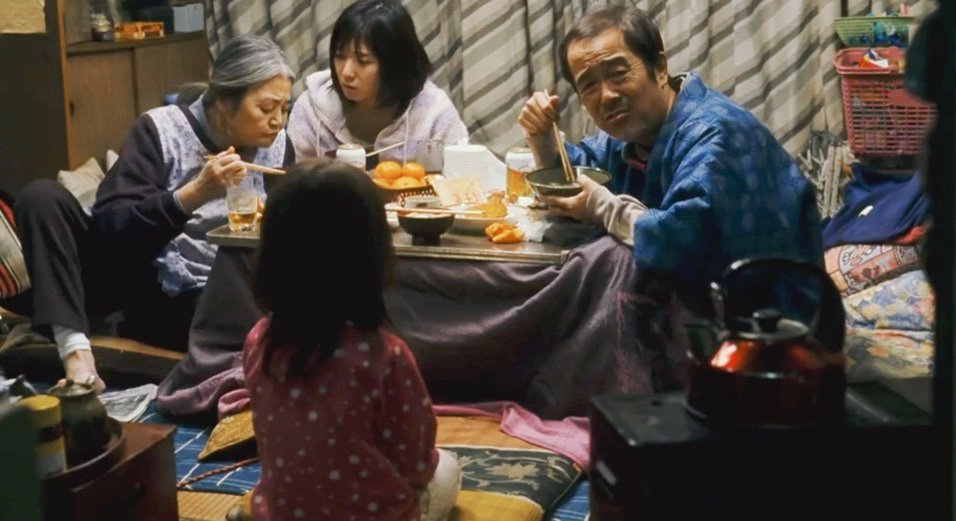
I think I’m always asking if that’s enough. Sometimes I worry that it’s just too fragile. But at the same time, blood ties make you much more responsible; there’s a lot of baggage that comes with them. And I think what the grandmother is saying, in that line, is that there are so many expectations from your own family, and that these can become an added responsibility, or more baggage. You can have different ideas about the family, different expectations. There’s less expectation if there’s no blood tie, so different types of thinking can exist within the family.
In Shoplifters, while that father wants to be called Dad, I don’t think that he can be a father. And I think it’s when he lets go, when he’s said that he’s no longer the dad – maybe that’s when he becomes the father. The family isn’t quite a real family until they’ve broken up; once they’re apart, they become more of a family. Once he’s let go of the son, maybe then, and not before, he becomes more of a father. While he’s wanting to be the father, he’s not quite a father.
Some years ago you said that you have made films from the point of view of a son looking at his father (Hana, Still Walking), but that now you are yourself a father, you’ve begun to make films from the father’s point of view. After the Storm is such a film. But in Shoplifters, I felt that the centre of sympathy is the boy. As director, where do your sympathies lie?
It was deliberate that the emphasis lies with the boy. The house that we used in the film is very similar the house where I lived until I was nine. The actual house was smaller than that, and there were six of us who used to live in that small house. So I used to live in the cupboard, and I wanted the story to be from the point of view of the boy who slept in that cupboard.
Maybe that’s not just me myself. The theme is the disappointment a son feels about his father as he grows up, so I think it’s portraying what any other boy, any other family would go through, as you grow up experiencing disappointment about your own father. It’s told from that perspective.
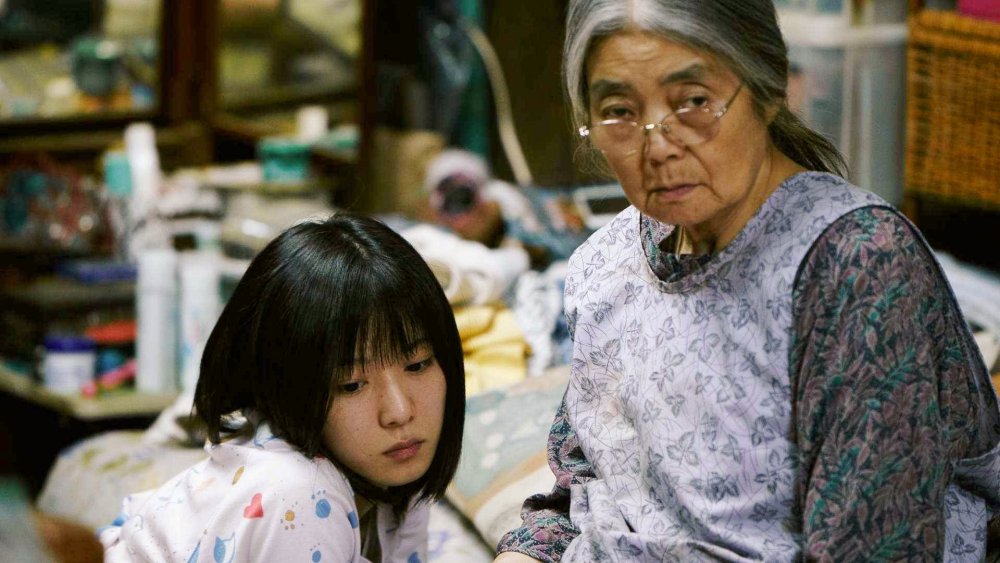
Matsuoka Mayu with Kiki Kilin as Shibata Hatsue
Maybe it’s a delicate question, but this film marked your last collaboration with the late and much lamented actor Kiki Kilin, who plays the grandmother. Would you be able to tell me something about your working relationship with her, on this film and before?
I just saw this at the station [he shows me a photograph of stationary shop kikki.K]. I’m going to send it to her daughter.
I went to her [Kiki’s] wake. I couldn’t go to the funeral, but I wrote a tribute. She had told me to forget about an old woman like her and said I should go and work with younger people… My opinion, my comment about her was my tribute there; that was all I had to say about her. So I’ve said there will be no more comments, no more interviews about her.
But for the last ten years I think it was more than just a partnership between a film director and an actress. So I need to think about what to do without her now, how to make films without her.
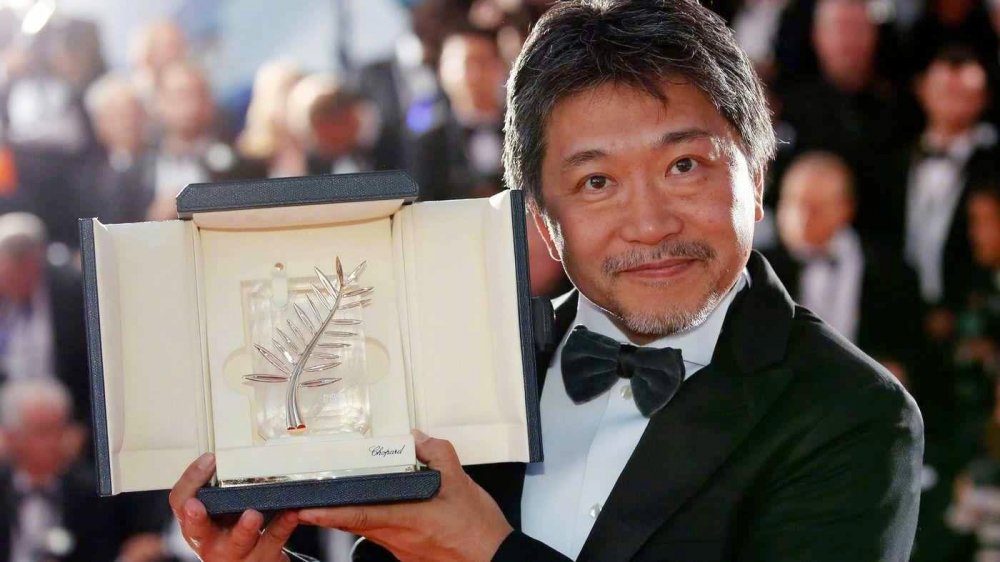
Koreeda Hirokazu with his Cannes Palme d’Or for Shoplifters (2018)
I’m sorry for your loss. I hope you’ll find a way to make films without her… I suppose I should ask about your future plans. After the Palme d’Or, which is maybe the most prestigious prize in world cinema, what remains for you to achieve?
I’m here now [at BAFTA] in relation to the Academy Award for Best Foreign Film – although it’s not exactly a campaign – so I might have to say that I’m aiming for that next. But honestly, I don’t make films to win awards.
Still, when I won the Palme d’Or, I felt very clearly that it widened my perspective on the films that I could make. The realisation that I have more options, and that I don’t have to aim only to win awards in Japan – that’s a very fortunate situation. And I still have the spirit to meet the challenge and make the best of that situation. That’s the way I feel.
Thanks to interpreter NAME, and Hanako Fujino, for their assistance with parts of the Japanese.
-
The Digital Edition and Archive quick link
Log in here to your digital edition and archive subscription, take a look at the packages on offer and buy a subscription.




